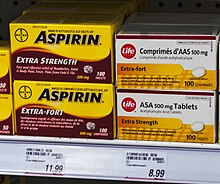
Back علامة تجارية للمتجر Arabic Marca de distribuïdor Catalan Privátní značka Czech Private label Danish Handelsmarke German Marca blanca Spanish Omamärgitoode Estonian Marka zuri Basque برند اختصاصی Persian Kaupan oma merkki Finnish

A private label, also called a private brand or private-label brand, is a brand owned by a company, offered by that company alongside and competing with brands from other businesses.[1][2] A private-label brand is almost always offered exclusively by the firm that owns it, although in rare instances the brand is licensed to another company.[3] The term often describes products, but can also encompass services.
The most common definition of a private label product is one that is outsourced: company A makes a product for company B, which company B then offers under their brand name.[4][5][6] However, it can also define products made in retailer-owned firms.[7][8] For example, in 2018, The Kroger Company had 60% of its private brands produced by third parties; the remaining 40% was manufactured internally by plants owned by Kroger.[9] Private-label producers are usually anonymous, sometimes by contract. In other cases, they are allowed to mention their role publicly.[10][11]
- ^ Hargrave, Marshall. "How Private Brands Matter". Investopedia. Archived from the original on 28 March 2022.
- ^ Fitzell (1982), p. 9: "Any time a product is packaged under a label owned by a retailer, it can be called private label."
- ^ Fitzell (1982), p. 4.
- ^ Morrison, Stella. "How Private Labeling Works". business.com. Archived from the original on 2 May 2022.
- ^ MBA Skool Team. "Private Label Meaning & Definition". MBA Skool. Archived from the original on 18 September 2020.
- ^ Mahmoud, Rasha (31 May 2020). "Private Label: Definition, Example, Pros & Cons". Retail Dogma. Archived from the original on 2 May 2022.
- ^ "What is Private Labeling?". Ecommerce CEO. Orbit Local LLC. Archived from the original on 4 March 2022.
- ^ Cite error: The named reference
Fitzell_(1982)_p10was invoked but never defined (see the help page). - ^ Cite error: The named reference
Aylward_(2018)was invoked but never defined (see the help page). - ^ Cite error: The named reference
Hirsh_(2022)was invoked but never defined (see the help page). - ^ Cite error: The named reference
Dixon_(2017)was invoked but never defined (see the help page).